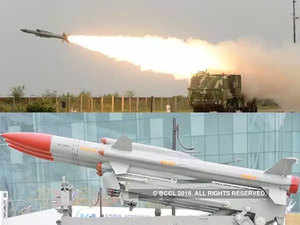At UN, Pakistan attacks growing arms sales to India
Pakistan has attacked growing arms sales to India by several
countries, including the US and Russia, calling them "double
standards" that jeopardise regional balances.
 |
This month signed a deal with
Moscow to buy an advanced air defence missile system, the S400, at an estimated
cost of about $5 billion. (Representative image)
|
"The policy of double standards towards South Asia,
based on narrow strategic, political and commercial considerations, must be
eschewed," Jehanzeb Khan, a First Secretary, in Pakistan's UN Mission,
said on Monday during a debate on conventional weapons in the General Assembly
committee dealing with disarmament.
He did not name India or the countries selling weapons to
India, but the context made the references clear.
Khan said in an obvious reference to India that in South Asia "one state's military spending grossly and vastly outnumbers that of others" and that "this has the potential of fueling instability and jeopardising the delicate regional balance."
"Islamabad was concerned over the growing transfers of conventional armaments especially in volatile regions that are inconsistent with the imperatives of maintaining peace, security and stability," he added.
Khan said in an obvious reference to India that in South Asia "one state's military spending grossly and vastly outnumbers that of others" and that "this has the potential of fueling instability and jeopardising the delicate regional balance."
"Islamabad was concerned over the growing transfers of conventional armaments especially in volatile regions that are inconsistent with the imperatives of maintaining peace, security and stability," he added.
He said, "Pakistan, for its part, is committed to the
establishment of a strategic restraint regime in South Asia, which includes an
element of conventional force balance.
He did not say how Pakistan would achieve a conventional
force balance with India given the wide disparities in the economies of the two
countries nor did he acknowledge that India's military capabilities have to
take China into account.
Pakistan is smarting under US decisions to block military
aid.
Last month, Pentagon said it would withhold $300 million aid
in what is known as coalition support funds citing Islamabad's failure to curb
terrorist organisations including the Haqqani Network and the
Lashkar-e-Taiba.
The Congress cut $500 million in payments to Pakistan from
the Defense Department budget in March.
In January President Donald Trump's administration announced it was blocking most military aid to Pakistan estimated to be in the range of $1.3 billion.
Meanwhile last month, India and the US signed the Communications Compatibility and Security Agreement (COMCASA) paving the way for India to access and buy advanced weapons and military technology.
The US is also pitching several advanced military jets and other weaponry to India.
This month India defied the US, which has threatened sanctions on those making military purchases from Russia, and signed a deal with Moscow to buy an advanced air defense missile system, the S400, at an estimated cost of about $5 billion.
In January President Donald Trump's administration announced it was blocking most military aid to Pakistan estimated to be in the range of $1.3 billion.
Meanwhile last month, India and the US signed the Communications Compatibility and Security Agreement (COMCASA) paving the way for India to access and buy advanced weapons and military technology.
The US is also pitching several advanced military jets and other weaponry to India.
This month India defied the US, which has threatened sanctions on those making military purchases from Russia, and signed a deal with Moscow to buy an advanced air defense missile system, the S400, at an estimated cost of about $5 billion.
EmoticonEmoticon